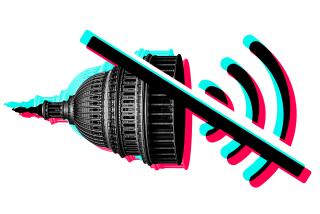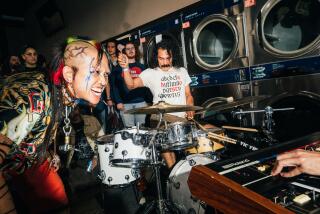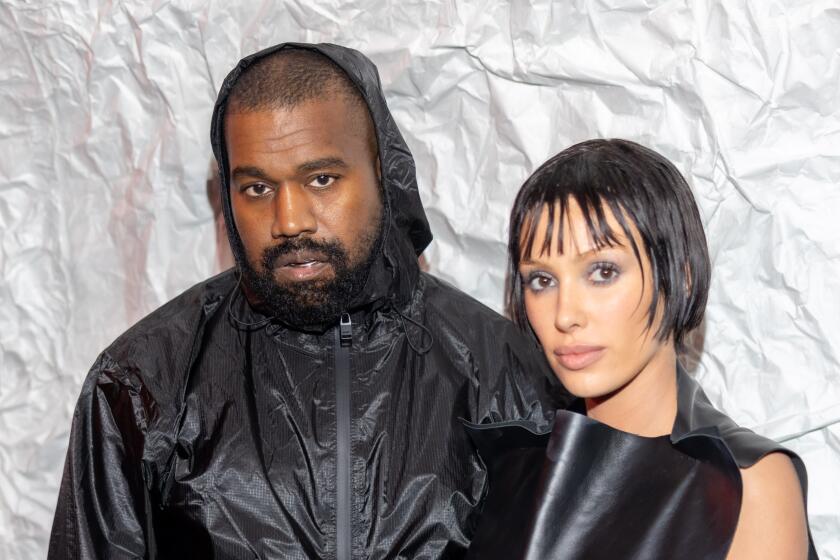On new record ‘Burn,’ Little Boots tries to see if the future really is female
Out on the sunny back porch of her Atwater Village home, pop singer Little Boots is trying to explain how blockchain — the ledger technology that underpins digital currencies such as bitcoin — could upend the music business.
“The song file would be embedded with all the information for the songwriters and the samples used,” the singer born Victoria Hesketh explained. The blockchain code would instantly verify when and how a song is used commercially — in a social media video, on a streaming service or in an independent film — and immediately pay out everyone involved, making an end run around labels and publishers that can take months to cut those checks.
“It could seriously shake things up,” Hesketh said. “People need music to not be a nightmare.”
A non-nightmarish music scene: that’s the subtext for the new work from the British singer and producer, now based in L.A. after a decade of pop stardom with one foot in the after-hours underground. The promised utopia of infinite streaming, diverse festival bills and more respectful dudes at shows is, to put it mildly, not turning out quite like idealists hoped, especially for newer or independent acts.
So on her new EP “Burn,” Hesketh took everything into her own hands to make the kind of world she envisioned. She worked with all-female or non-binary producers and released it on her own On Repeat label (after stints on various majors and large indies), while absorbing the sonic lessons of her late-night DJ gigs.
It’s a new model for her music, one that she’ll debut live at El Cid on Saturday. But it’s one that could have much more meaningful returns.
Hesketh just moved into this house a few months ago, and she’s still unpacking a roomful of weird old analog synthesizers. She’s a gifted pianist who can wring interesting sounds from almost any piece of electronic gear. But “Burn” is primarily informed by her months behind the DJ decks in sweaty warehouses, building hours-long techno sets for people who may not even have been familiar with her career as one of the U.K.’s most interesting pop stars.
For “Burn,” she worked with underground and avant-garde electronic fixtures like Planningtorock, Lauren Flax, Joyce Muniz and Cora Novoa, and mixed the EP with Bjork collaborator Marta Salogni. Working with all-female and non-binary artists was a political statement, sure, but it was also a practical way to shake up her typical ways of working.
“Collaborations define a record, so I thought that maybe gender was something I should think about,” Hesketh said, citing influential rising acts like the Black Madonna and Peggy Gou, who write and produce their own work in addition to DJing.
“In the studio, there’s often such a basic gender divide — the men sit in the big chair making beats and working the controls, while women do the top-line melody writing and other ‘girly’ things. Those roles had been set for a long time, and studios are often so full of ego.”
While her 2009 debut LP “Hands” was an airtight electro-pop record aimed straight at the Top 40, “Burn” takes its time to wind through ’90s deep house, clanging techno noise and whispery melancholy in the songwriting. Hesketh calls it her “tears on the dance floor” record, and in an era when even tough-guy rappers are touting depression and heartbreak, it might be a savvy pop move after all (“Burn” topped the iTunes electronic music charts when it was released on April 6).
But it’s also a bit of a spacewalk for Hesketh, venturing back out as an L.A. independent artist after a decade in the U.K. pop firmament. Popular acts like Charli XCX and Dua Lipa all probably owe a little something to Hesketh’s aesthetic and work ethic as a writer. Yet like fellow Brit pop sensation and Angeleno ex-pat Kate Nash, Hesketh’s entering the next stage of her career building her own systems outside of the major-label pop machinery.
That’s not to say it was an easy or obvious choice.
“I do still have a bit of impostor syndrome,” she said. “But why do I feel that way? I think all artists have a bit of that. You’re scared because you’re challenging yourself.”
On Saturday, she’ll debut her new live setup and play the “Burn” songs for the first time onstage. For pop fans who have stuck with her for a decade, don’t fret — she hasn’t gone full Berlin techno-serious.
“I bought a jacket made of hair and a wireless keytar for this show,” she said. She’s DJ’d at scores of Pride festivals lately, and Hesketh was thrilled when one fan described her crowds as a kind of “live Grindr.”
But for all the positive strides of her new approach, there’s still so much uncertainty in the modern music business for women. She cited setbacks like the cancellation of this year’s FYF Fest, which had been praised for booking all-female headliners and plenty of progressive female electronic acts, only to be canceled for allegedly slow ticket sales.
“It’s trial and error. It was a good lineup, and festival fatigue shouldn’t be equated with gender,” she said. “Gender isn’t a genre.”
But one thing she’s certain of: better ways of creating and experiencing music are still possible. Someone just has to go and make them.
“In your 30s, you know yourself and come at it with a new confidence,” she said. “People always said that my music was right in the crack between pop and the underground. That’s fine. I’ll live there. I’ll own that.”
♦ ♦ ♦ ♦ ♦ ♦ ♦ ♦ ♦ ♦
Little Boots
When: 10 p.m. Saturday
Where: El Cid, 4212 W. Sunset Blvd., L.A.
Tickets: $15-$25
Info: elcidsunset.com
More to Read
The biggest entertainment stories
Get our big stories about Hollywood, film, television, music, arts, culture and more right in your inbox as soon as they publish.
You may occasionally receive promotional content from the Los Angeles Times.







